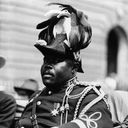Tulsa Race Massacre: Barbaric but not prosecutable, DOJ finds
The Justice Department in a report released Friday concluded "no avenue for prosecution exists" for the crimes carried out during the 1921 Tulsa Race Massacre, one of the deadliest series of murders in U.S. history.
The big picture: The findings come roughly three months after the DOJ launched its first-ever federal probe into the coordinated attack that left an estimated 300 Black residents dead and decimated the thriving Greenwood community, also known as "Black Wall Street."
- The event is widely regarded as the worst race massacre in U.S. history.
- The DOJ noted in its report — which corroborates survivor testimonies and existing research — that its conclusion was "despite the gravity of the department's findings." It was also the federal government's first comprehensive acknowledgment of the massacre.
- The report confirms that the massacre was not just mob violence but a coordinated military-style attack that involved systematic arson, looting, and killings carried out by white residents, some of whom were deputized by the Tulsa police.
What they're saying: Assistant Attorney General Kristen Clarke of the Justice Department's Civil Rights Division called the massacre "a civil rights crime unique in its magnitude, barbarity, racist hostility and its utter annihilation of a thriving Black community."
- "Until this day, the Justice Department has not spoken publicly about this race massacre or officially accounted for the horrific events that transpired in Tulsa," she said.
- "This report breaks that silence by rigorous examination and a full accounting of one of the darkest episodes of our nation's past."
Zoom out: The DOJ report says prosecution is no longer feasible because the youngest potential defendants would now be over 115 years old and relevant statutes of limitations "expired decades ago," leaving no legal avenue for federal charges.
The DOJ report found:
- Coordinated Attack: The DOJ found that — depending on how you define participation — up to 10,000 white residents of Tulsa devastated Greenwood.
- Government Complicity: Local law enforcement disarmed Black residents, detained survivors in camps, and participated in arson and murder. Tulsa hindered recovery by imposing restrictive fire codes, rejecting aid, and resisting rebuilding efforts.
- Legal Failures: The DOJ acknowledged that civil rights laws could have allowed hate crime prosecutions, but in 1921, no such protections existed and federal laws were unenforced, leaving survivors and descendants without justice.
Between the lines: While the report recognizes its historical significance and documents the trauma and loss suffered by Greenwood's residents, Rev. William Barber of the Repairers of the Breach expressed frustration at the limitations imposed by expired laws.
- "Isn't it a tragedy that we have a statute of limitations on the murdering of an entire community?"
- "If the Justice Department says the statute of limitations is a law, then there ought to be a campaign for new legislation that says, when the government has participated in political murder, this country will not allow a statute of limitation to prevent justice."
The bottom line: Barber stressed the need to reframe such events in historical narratives, because we "can't let these stories be told incorrectly."
- "We must not use the language of 'riot.' Whether it was Springfield, Illinois; Wilmington, North Carolina; or Tulsa—they weren't riots. They were murders, bombings, and insurrections."
- "The Justice Department's findings must be built upon, and this moment must stir action, even if the results take time. Sometimes what you do in one moment has an impact in another."
More from Axios:
- 1st Tulsa Race Massacre victim identified in mass grave honored with memorial
- Uncovering the Tulsa Race Massacre after 100 years
- 100 years after Tulsa Race Massacre, last living survivors urge U.S. to not forget






